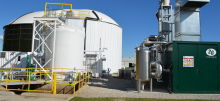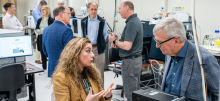
Researchers Map the Worldwide Threat of Antibiotic Resistance in Livestock Waste
A major international study by Michigan State University and partner researchers has uncovered a hidden danger lurking in animal farms around the world: Livestock manure is packed with antibiotic resistance genes that could threaten human health. This study spanned 14 years and represents the most comprehensive survey of livestock antibiotic resistant genes to date.

O'Dell Publishes Book on Creating Theatre With Neurodiverse Audiences in Mind
MSU Theatre Specialist Dionne O’Dell releases her debut book, The Sense-Ability Ensemble’s Guide to Creating Theatre for Audiences that are Neurodiverse, offering an inside look at building inclusive performances from the ground up. Available July 1, 2025.

Some Studies Might Not Paint Full Picture of How Plants Respond to Climate Change
Scientists may be underestimating how plants will respond to rising global temperatures when they study hot summers but not warming winters, Michigan State University ecologists found.

Transforming Waste Into a Public Asset: Michigan State University Leads Next-Generation Anaerobic Digestion Innovation
As conversations continue to build among policymakers and industry leaders on how to best address nutrient runoff, energy transition and sustainable waste management in the Great Lakes region, Michigan State University scientists are pioneering solutions that transform organic waste into a public asset.

Smith Leads Innovative Effort to Protect Lake Whitefish Using Genetic Markers
A Michigan State University researcher is leading a groundbreaking genetic effort to protect Lake Michigan’s dwindling lake whitefish population, an essential species for ecosystems, economies, and tribal communities alike.

MSU-Led Research Team Receives $500K Grant to Combat Herbicide-Resistant Weeds in Soybeans
A national research team led by Michigan State University has received a $500,000 grant from the United Soybean Board to develop new diagnostic tools for herbicide-resistant weeds in soybeans. The award currently covers one year but can be extended for up to three years.

MSU Researchers to Explore Viability of Agriculture, Solar Power Generation Together in Michigan
Michigan State University researchers and MSU Extension educators are evaluating the potential of agrivoltaics — which combines agricultural operations with solar energy production — in Michigan.

Critical Mass: Core Upgrades Pave Way for Spartan Science
A revamped facility space, installation of advanced instruments, and the vision of a new director are providing Spartan scientists with the tools they need to achieve cutting-edge science at MSU’s Mass Spectrometry and Metabolomics Core.

MSU Project Documenting Enslaved Individuals Publishes Latest Data of Black Americans Born Before Emancipation
Michigan State University’s Enslaved.org, in partnership with other organizations, documents the lives of named enslaved individuals of African descent. Its latest data release makes information on two million Black Americans born before emancipation, identified in the 1900 census, available for discovery and download.

Puckett Leads Postcard Research Project to Connect Members of the Transgender Community
Researchers from Michigan State University and the University of Oregon have given out over 10,000 postcards to the community over the past couple of years — postcards that highlight what resilience means to the transgender and nonbinary community.
